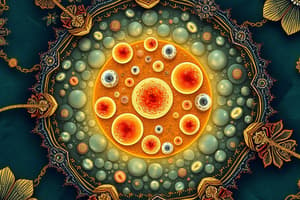Podcast
Questions and Answers
জীবনের সংশ্লেষণে প্রধান অংশ হিসেবে কোনটি আছে?
জীবনের সংশ্লেষণে প্রধান অংশ হিসেবে কোনটি আছে?
- নিউক্লিক এসিড
- কোষ (correct)
- গ্যান্ড
- প্রোটিন
মোলেকুল: কোনটি হিসেবে একটি কোষের রাসায়নিক গঠনের ভাঙ্গুর?
মোলেকুল: কোনটি হিসেবে একটি কোষের রাসায়নিক গঠনের ভাঙ্গুর?
- মিনারেল
- সাক্ষর
- কার্বোহাইড্রেট (correct)
- রাসায়নিক
DNA-র পাশাপাশি 'RNA' এর কি দায়িত্ব?
DNA-র পাশাপাশি 'RNA' এর কি দায়িত্ব?
- RNA-র উন্নয়ন
- RNA-র নিরীক্ষা
- DNA-র উন্নয়ন (correct)
- DNA-র নিরীক্ষা
Prokaryotic cell-এ 'nucleus' অর্থাৎ 'নিউক্লিয়াস' অনুপ্রেরনা হয়?
Prokaryotic cell-এ 'nucleus' অর্থাৎ 'নিউক্লিয়াস' অনুপ্রেরনা হয়?
'Genetics' এর 'Genes' inheritance (Dharmoparapatti)-r upor ki vabei impact korbe?
'Genetics' এর 'Genes' inheritance (Dharmoparapatti)-r upor ki vabei impact korbe?
প্রাণীর উন্নতি ও বিকাশের অধ্যয়নে কোনটি সহায়ক?
প্রাণীর উন্নতি ও বিকাশের অধ্যয়নে কোনটি সহায়ক?
প্রাণীর উন্নতির চেয়ে কোনটি সর্বোত্তম হিসাবে স্বীকৃত?
প্রাণীর উন্নতির চেয়ে কোনটি সর্বোত্তম হিসাবে স্বীকৃত?
প্রাণীর উন্নতি সর্বাধিক 'পরিবর্তন' করা হয়?
প্রাণীর উন্নতি সর্বাধিক 'পরিবর্তন' করা হয়?
'Developmental Biology' এর অনুশীলনের মূখ্য 'ধারনা' কি?
'Developmental Biology' এর অনুশীলনের মূখ্য 'ধারনা' কি?
'Physiology' -র 'homeostasis' -র 'maintenance' -র 'study' - 'homeostasis' - 'maintaining' 'effect' - 'essential'.
'Physiology' -র 'homeostasis' -র 'maintenance' -র 'study' - 'homeostasis' - 'maintaining' 'effect' - 'essential'.
Flashcards are hidden until you start studying
Study Notes
Exploring Life's Complexity: A Journey through Life Science
Life science, also known as biology, lies at the heart of understanding the natural world and is a dynamic and expansive field that encompasses a wide range of subjects. From the microscopic world of cells and molecules to the complex ecosystems of our planet, life science delves into the intricate workings of life itself.
Cells: The Building Blocks of Life
At the foundation of life science, we find cells. Cells are the basic units of life, and they make up all living organisms. They come in two main varieties: prokaryotic (like bacteria) and eukaryotic (like humans and plants). These cells contain a variety of structures and organelles that work together to perform essential functions for life.
Molecules: The Chemical Building Blocks of Cells
Life science also delves into the study of molecules, the fundamental units that make up cells, such as carbohydrates, lipids, proteins, and nucleic acids. These molecules interact with each other in an array of complex mechanisms to keep cells functioning optimally.
Genetics: The Code of Life
Genetics is the study of traits, heredity, and variation in living organisms. It explores how genetic information is stored, replicated, and expressed. DNA, the molecule of heredity, contains the instructions for building and maintaining living organisms. Genetics also explores how genes are inherited and how genetic variation arises.
Evolution: The History of Life
Evolution is the change in the genetic makeup of a population from generation to generation over time. It explains how new species arise and how life has changed over millions of years. Evolution is driven by natural selection, genetic drift, gene flow, and mutation. Life science studies the principles of evolution and how it has shaped life on Earth.
Ecology: The Interactions of Life
Ecology is the study of interactions between living organisms and their environment. It explores how organisms interact with one another and their environment, as well as how ecosystems function. Ecology also investigates the distribution and abundance of organisms, and how they are influenced by factors such as climate and human activity.
Developmental Biology: From Cell to Organism
Developmental biology is the study of how organisms grow and develop from a single cell (fertilized egg) into complex, multicellular organisms. This field investigates the processes and mechanisms that govern growth, cell differentiation, and organ formation.
Physiology: The Function of Living Organisms
Physiology is the study of the mechanical, physical, and biochemical functions of living organisms and their parts. It explores how organisms function at the cellular, tissue, organ, and organism levels. Physiology also investigates how organisms adapt to their environment and how they maintain homeostasis.
Medicine: The Application of Life Science
Medicine is a field that applies the principles of life science to improve human health. It investigates the causes, prevention, and treatment of diseases, as well as how to maintain health and well-being. Medicine also explores the development and application of new technologies and treatments to improve healthcare.
Life science is a fascinating and dynamic field that continues to grow as our understanding of life and the natural world expands. The topics outlined above are just a few examples of the many branches of life science, and each offers a unique perspective on the complexity and wonder of life. Whether you're a curious student, a budding scientist, or just someone seeking to learn more about the world around you, life science has something to offer for all.
Studying That Suits You
Use AI to generate personalized quizzes and flashcards to suit your learning preferences.




